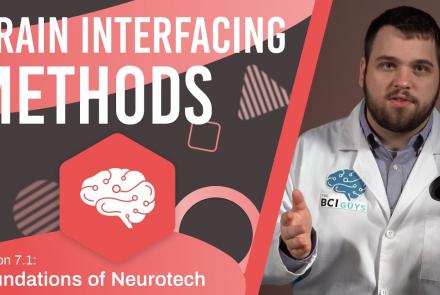In this lesson, the simulation of a virtual epileptic patient is presented as an example of advanced brain simulation as a translational approach to deliver improved clinical results. You will learn about the fundamentals of epilepsy, as well as the concepts underlying epilepsy simulation. By using an iPython notebook, the detailed process of this approach is explained step by step. In the end, you are able to perform simple epilepsy simulations your own.
Difficulty level: Beginner
Duration: 1:28:53
Speaker: : Julie Courtiol
This lesson provides an introduction to the Symposium on Science Management at the Canadian Association for Neuroscience 2019 Meeting.
Difficulty level: Beginner
Duration: 9:52
Speaker: : Randy McIntosh
This lesson gives a primer to project management in a scientific context, with a particular neuroinformatic case study.
Difficulty level: Beginner
Duration: 19:06
Speaker: : Kelly Shen
In this lesson, you will hear about the current challenges regarding data management, as well as policies and resources aimed to address them.
Difficulty level: Beginner
Duration: 18:13
Speaker: : Mojib Javadi
This lesson covers "Knowledge Translation", the activities involved in moving research from the laboratory, the research journal, and the academic conference into the hands of people and organizations who can put it to practical use.
Difficulty level: Beginner
Duration: 15:05
Speaker: : Jordan Antflick
In this lesson, you will hear about the various methods developed and employed in managing performance.
Difficulty level: Beginner
Duration: 12:57
Speaker: : Christa Studzinski
This lesson provides an overview of how to manage relationships in a research context, while highlighting the need for effective communication at various levels.
Difficulty level: Beginner
Duration:
Speaker: : Helena Ledmyr
This hands-on tutorial walks you through DataJoint platform, highlighting features and schema which can be used to build robost neuroscientific pipelines.
Difficulty level: Beginner
Duration: 26:06
Speaker: : Milagros Marin
This lecture discusses how FAIR practices affect personalized data models, including workflows, challenges, and how to improve these practices.
Difficulty level: Beginner
Duration: 13:16
Speaker: : Kelly Shen
This lecture covers how to make modeling workflows FAIR by working through a practical example, dissecting the steps within the workflow, and detailing the tools and resources used at each step.
Difficulty level: Beginner
Duration: 15:14
Speaker: : Salvador Dura-Bernal
This lecture covers the ethical implications of the use of brain-computer interfaces, brain-machine interfaces, and deep brain stimulation to enhance brain functions and was part of the Neuro Day Workshop held by the NeuroSchool of Aix Marseille University.
Difficulty level: Beginner
Duration: 1:02:00
Speaker: : Jens Clausen
Course:
In this module you will learn the basics of Brain Computer Interface (BCI). You will read an introduction to the different technologies available, the main components and steps required for BCI, associated safety and ethical issues, as well as an overview about the future of the field.
Difficulty level: Beginner
Duration: 11:02
Speaker: : Colin Fausnaught
Course:
In this module, users will learn about the different types of neurotechnology and how each of them works. This will be done through the metaphor of going to a symphony... in your brain. Like a symphony, brain processes emerge from collections of neural activity. This video encourages us to imagine ourselves moving to different areas in the concert hall to understand where different technologies interface. Once the concert ends, we talk about underlying neural mechanisms and technology that allow researchers and innovators to interact with the brain.
Difficulty level: Beginner
Duration: 10:49
Speaker: : Harrison Canning
Course:
This module addresses how neurotechnology is currently used for medical and non-medical applications, and how it might advance in the future.
Difficulty level: Beginner
Duration: 6:57
Speaker: : Colin Fausnaught
Course:
This module covers many types of invasive neurotechnology devices/interfaces for the central and peripheral nervous systems. Invasive neurotech devices are crucial, as they often provide the greatest accuracy and long-term use applicability.
Difficulty level: Beginner
Duration: 9:40
Speaker: : Colin Fausnaught
Course:
This module covers many of the types of non-invasive neurotech and neuroimaging devices including electroencephalography (EEG), electromyography (EMG), electroneurography (ENG), magnetoencephalography (MEG), and more.
Difficulty level: Beginner
Duration: 13:36
Speaker: : Harrison Canning
Course:
Neuromodulation refers to devices that influence the firing of neurons which can be useful in many medical applications. This modules covers what neuromodulation is, how it affects the functioning of neurons, and the many forms that these devices take on.
Difficulty level: Beginner
Duration: 12:18
Speaker: : Harrison Canning
Course:
This modules covers neuroprosthetic and cognitive enhancement devices that can help augment our capabilities by enhancing memory, as well as restoring or improving our senses.
Difficulty level: Beginner
Duration: 8:35
Speaker: : Colin Fausnaught
Course:
This module goes over the methods that neurotechnologists use to turn brain data into commands a computer or a machine can understand. We cover data collection, processing, filtering, analysis, how to generate an action in a device, asynchronous BCIs that use population encoding, and synchronous BCIs that use P300, SSVEP, N100, and N400 signals.
Difficulty level: Beginner
Duration: 14:47
Speaker: : Colin Fausnaught
Course:
This module covers the many things that brain-computer interfaces can and will be able to do, including motor neuroprosthetics like prosthetic arms, exosuits, and vehicle control, as well as computer and machine interfacing use-cases.
Difficulty level: Beginner
Duration: 16:39
Speaker: : Harrison Canning
Topics
- Artificial Intelligence (5)
- Philosophy of Science (5)
- Notebooks (2)
- Connectomics (1)
- protein-protein interactions (1)
- Extracellular signaling (1)
- Animal models (2)
- Assembly 2021 (27)
- Brain-hardware interfaces (12)
- Clinical neuroscience (3)
- International Brain Initiative (2)
- Repositories and science gateways (6)
- Resources (5)
- General neuroscience
(9)
- General neuroinformatics
(4)
- Computational neuroscience (67)
- Statistics (1)
- Computer Science (5)
- Genomics (1)
- Data science
(8)
- Open science (11)
- (-) Project management (6)
- Education (1)
- Neuroethics (25)



















